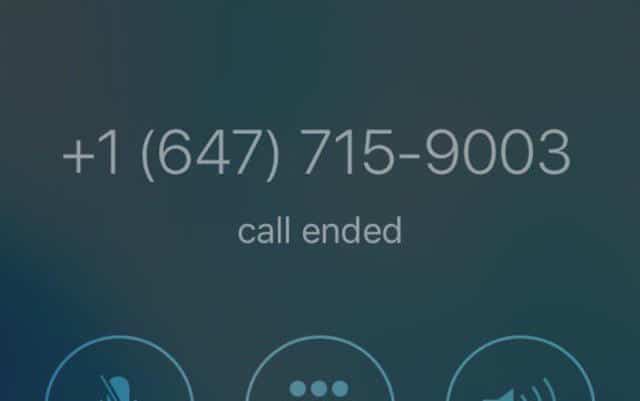Re-Emerging Scam Bilking People Out of Hundreds of Dollars
Published February 13, 2018 at 9:30 pm

Scams are common and many–if not most–people are learning how to detect and avoid them.
Still, some are just unusual enough to trick people into parting with their hard-earned money–sometimes quite a bit of it.
Over the past few days, people across the GTA have been warned to avoid what’s called the “one-ring scam.”
As for how it works, a person is called from an unfamiliar number with an area code that indicates the call is coming from a different country. When the person picks up, the line goes dead after one ring.
In some cases, curious recipients call the number back. If someone has a friend or relative living overseas, they might be more vulnerable to a scam like this, as they’re more likely to call back.
“Once hooked, the victims of the ‘one ring’ scam are supposedly separated from their money through a variety of means: keeping them on the line for as long as possible while they rack up international call tolls, duping them into unknowingly calling premium-rate phone numbers, or enticing them into signing up for pricey services,” explains Snopes.com.
That said, the scam might not lead to as much financial hardship as some more dire warning emails have let on.
“…it appears that the prevalence of the one-ring scam and the potential damages its victims might suffer are considerably lower than the circulated warnings about it often suggest,” Snopes says.
While it’s entirely possible to rack up long-distance charges, it is not possible to unknowingly relinquish your private banking information–at least not by simply returning a call and waiting on the line.
Financial and personal information–including the contact list on your cell phone–cannot typically be accessed by a third-party during a simple call back. In order for personal info to be stolen, your device needs to be hacked or otherwise compromised.
Snopes also says it’s unlikely you’ll be signed up for a costly service simply by calling a number back. However, victims can be duped into signing up for a service if they end up connecting with someone who tricks or pressures them into making a fraudulent purchase or providing credit card information. For that reason, Rogers is warning its customers to be wary.
To our customers – if you receive a call from an unknown international number that disconnects immediately, it could be part of a worldwide scam known as Wangiri fraud. Please do not call the number back.
— RogersHelps (@RogersHelps) February 13, 2018
Also, calling a mysterious number back and waiting for an answer could cost you long-distance fees–sometimes hundreds of dollars worth.
Authorities are advising anyone who receives a one-ring call from a foreign country to avoid calling the number back without confirming that the call is legitimate (and if you aren’t expecting a call from that part of the world, there’s a good chance it’s not).
If you believe you’ve been victimized by this scam, report the incident to police or the Canadian Anti-Fraud Centre.
INsauga's Editorial Standards and Policies